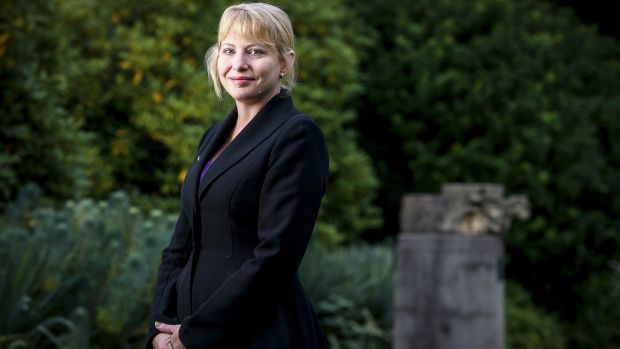 DLP crossbencher Rachel Carling-Jenkins at Parliament House. Photo: Eddie Jim
DLP crossbencher Rachel Carling-Jenkins at Parliament House. Photo: Eddie Jim
It took almost six decades for the Democratic Labour Party to get a woman elected to Parliament, and only 18 months for her to reignite one of Spring Street’s most divisive debates.
But Rachel Carling-Jenkins made it clear from the start that she wouldn’t be a bystander: not when it comes to abortion law; not when it involves an unborn child; and not when she genuinely believes in a cause.
As the crossbench MP declared in her maiden speech after the 2014 state election: “We now look back at slavery and are appalled at the treatment slaves received and horrified at the very idea that one person could own another. In the decades to come, I pray that we will look back at this era, appalled at the babies we killed and horrified at the very idea that we would enslave women in prostitution.”
“Under my watch, there will not be silence on these issues,” she vowed.
Carling-Jenkins certainly hasn’t been silent when it comes to women’s reproductive rights, but her desire to “remedy” the law will be tested on Wednesday when debate begins on a private members bill targeting the legislation’s most contentious part: late term abortions.
The DLP bill, which was drafted over several months, is the first genuine attempt to amend the reforms passed by Parliament in 2008. Under the plan, terminating a pregnancy after 24 weeks would effectively be banned; doctors would be jailed for up to five years if they conduct abortions at that stage of the cycle; and hospitals would be required to provide a range of services for women in “distress” in a bid to encourage more patients to continue with their pregnancy.
Carling-Jenkins insists her proposal is not based on blind faith, telling The Sunday Age: “If this was a religious crusade I’d be trying to get rid of all abortions. This is coming from working in welfare for 20 years and genuinely valuing people’s lives.”
But in an upper house where the Andrews government doesn’t have a majority, the bill could be more successful than you think – partly because both major parties are expected to put the matter to a conscience vote, and partly because, as one Liberal MP put it, “she was willing to compromise” on the details.
Last year, when Carling-Jenkins first announced plans to change the law, the aim was to ban abortions at 20 weeks. But after consulting doctors, barristers, and other MPs, she decided to make the threshold 24 weeks – “the age of infant viability” – knowing that some people might support a woman’s right to have an abortion, but only to a point.
It’s the type of thinking that underpins the kind of politician she is: smart, strategic, determined to get some runs on the board. In Parliament, she’s natural rival to fellow crossbencher Fiona Patten, the Sex Party MP who has played an influential role progressing issues the DLP tends to oppose, such as safe access zones around abortion clinics.
But among the other crossbench MPs – Jeff Bourman and Daniel Young from the Shooters and Fishers Party; James Purcell from Vote 1 Local Jobs – she’s more at ease, often voting with the group to help or hinder the government’s agenda.
“Four out of five of us share a lot of the same values, and we can share quite a bit of influence if we stick together,” she says.
Elected through a quirk of preference deals and with only a tiny share of the vote, Carling-Jenkins comes from a party that has spent more time in the political wilderness than it has in office. As for her own decision to run for an upper house spot: “It was a light-bulb moment,” she says. “I found it increasingly hard to find people that I would vote for myself, so I decided to stop being critical from the outside, and actually get inside.”
Getting to this stage wasn’t always easy, mind you. A few years ago, a serious car crash left her with a chronic pain condition and the occasional need for a walking stick, which she tries not to use around Parliament for fear of being treated differently. Years of single motherhood inevitably came with its share of challenges. And after joining the DLP, she cut her political teeth working for John Madigan, the senator who eventually defected from the party – but not before accusing her of being a spy planted in his office by party officials.
Now at Spring Street, Carling-Jenkins happens to be the first woman finally elected to represent the DLP in any Australian parliament – “and I’m not even Catholic,” jokes the Pentecostal Church member. But she knows, too, that politics is a fickle business, so she’s determined to make the most of it – whether you agree with her or not.
“For a crossbencher of any persuasion, there’s an awareness that there’s not a long career here. It could just be one term, so you have to make as much impact as you can in that one term.”
